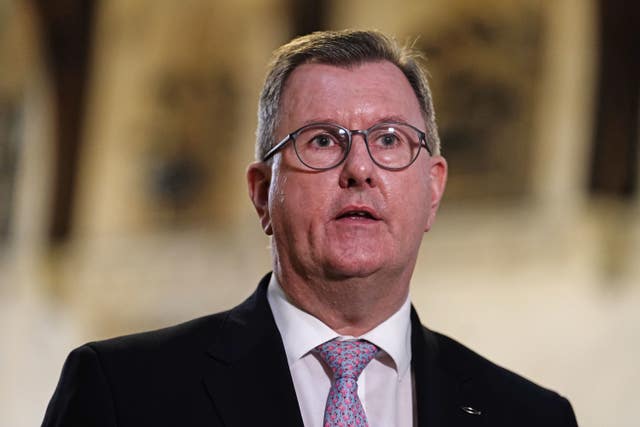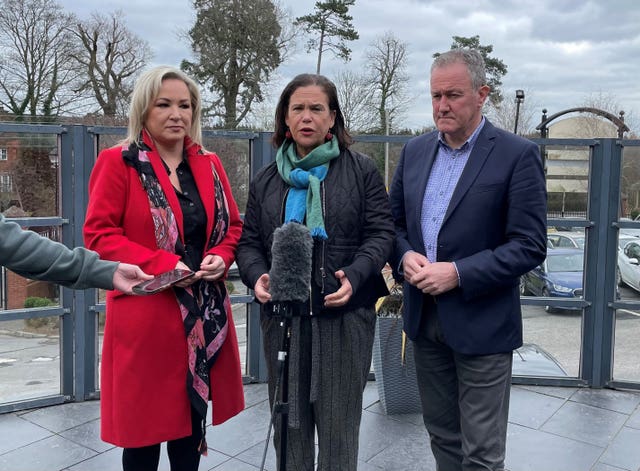Governance in Northern Ireland would probably involve a joint arrangement between the UK and Irish governments if powersharing is not restored at Stormont, Michelle O’Neill has said.
The Sinn Fein vice president reiterated her call on the DUP to end its blockade on devolution in Belfast following the deal on post-Brexit trade struck by London and Brussels.
Unionists have previously reacted angrily to any suggestion of Irish involvement in the governance of Northern Ireland in the absence of devolution.
While Ms O’Neill expressed a “cautious welcome” for the overall Windsor Framework deal she said her party had some concerns about its “Stormont brake” and the potential for it to create further problems around the application of future EU laws in Northern Ireland.
Sinn Fein’s Stormont leader said the result of last May’s Assembly election has to be honoured and powersharing restored.
“We obviously had a very historic election last May, for the very first time a nationalist was returned as first minister, and I am in the position of first minister-designate,” she told Sky News.
“The DUP have failed to honour that election to this point, but I still hope that they will get to that point, because powersharing is how politics works in the north.

“In fact, probably the alternative to powersharing would be some arrangement between the British and Irish government.”
The Stormont parties are due to receive briefings from UK Government officials in the week ahead on how the brake will operate.
The mechanism offers a minority of MLAs (30 from at least two parties) the ability to refer to the UK Government its concerns about the introduction of new EU laws in Northern Ireland. The Government could then potentially veto the application of those laws in the region.
Ms O’Neill said it would be “reasonable” that the two parties should come from different traditions in Northern Ireland, to prevent a scenario where either unionists or nationalists could alone pull the brake.
“I think that’s all very reasonable,” she told RTE Radio One.
“What we don’t want to see here is that in order to square the circle and to have achieved this agreement, we don’t want to see that they’ve created a new problem.
“But, yes, absolutely there shouldn’t be an ability for anybody to be able to, because of political reasons, to block.
“This mechanism is something that apparently is something only to be used whenever there is something that has significant impact, as opposed to anything that’s perhaps trivial by nature.”
The DUP has yet to decide whether to back the Windsor Framework.

While the DUP has made clear it will make a collective decision, factoring in views across the party, some prominent DUP figures including Sammy Wilson, Lord Dodds and Ian Paisley have already expressed concerns whether the changes to the Irish Sea trading arrangements go far enough to address their concerns over trade and sovereignty.
Ms O’Neill said it was time for the DUP to show “leadership” and agree to restoring powersharing while still continuing its process of examining the deal.
“They deliberately took a tactic, they decided to walk away from the executive in order to influence the negotiation (between the UK and EU), but the negotiation is now complete, so there’s no reason for them to stay outside of the executive,” she told Sky News.
“They should be back around the executive table, taking on the matters of the day. And then, yes, let us work through all the details of this in the deal because I equally have some concerns, particularly around this issue of a Stormont brake and what that might look like and how it can be used, because I certainly don’t want any deal to replace a problem with a problem.
“But these are things we can do whilst also being in the executive.”
Ms O’Neill said Northern Ireland’s continued single market access represents a huge opportunity for the region.
Ms O’Neill said the DUP cannot deliberate “endlessly” on whether it is going to accept the Windsor Framework and return to devolution.
“We now have this unique selling point, and I want to maximise that, and I want the Good Friday Agreement anniversary on top of that opportunity to be a huge catalyst for investment here, and that should not be missed,” she said.
“The DUP cannot go on in this vain endlessly. Yes, everybody wants to do their due diligence, but then get around the table and make politics work with the rest of us.”
The Northern Ireland Office insisted it will not countenance any joint authority arrangement in Northern Ireland involving the Irish Government.
Responding to Ms O’Neill’s comments, an NIO spokesman said: “We are not considering any changes to the Belfast (Good Friday) Agreement and we will not consider joint authority.
“Our sole focus is on ensuring Northern Ireland has a locally elected, accountable and effective devolved government in line with the agreement – to protect the gains it has delivered over the past 25 years.
“We have been clear that we will underpin arrangements in the Windsor Framework through amendments to the Northern Ireland Act 1998 to provide constitutional and democratic guarantees for the people of Northern Ireland. We will set out further detail in the coming weeks.”






